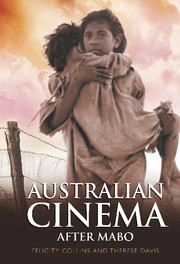Book contents
- Frontmatter
- Contents
- Acknowledgments
- Part 1 Australian Cinema and the History Wars
- Part 2 Landscape and Belonging after Mabo
- 5 Aftershock and the Desert Landscape in Heaven's Burning, The Last Days of Chez Nous, Holy Smoke, Serenades, Yolngu Boy, The Missing
- 6 Coming from the Country in Heartland, Cunnamulla and Message from Moree
- 7 Coming from the City in The Castle, Vacant Possession, Strange Planet and Radiance
- Part 3 Trauma, Grief and Coming of Age
- Bibliography
- Index
7 - Coming from the City in The Castle, Vacant Possession, Strange Planet and Radiance
Published online by Cambridge University Press: 31 January 2011
- Frontmatter
- Contents
- Acknowledgments
- Part 1 Australian Cinema and the History Wars
- Part 2 Landscape and Belonging after Mabo
- 5 Aftershock and the Desert Landscape in Heaven's Burning, The Last Days of Chez Nous, Holy Smoke, Serenades, Yolngu Boy, The Missing
- 6 Coming from the Country in Heartland, Cunnamulla and Message from Moree
- 7 Coming from the City in The Castle, Vacant Possession, Strange Planet and Radiance
- Part 3 Trauma, Grief and Coming of Age
- Bibliography
- Index
Summary
To be asked ‘where are you from?’ in Australia today is to imply not only that there is geographic mobility within the nation's borders but that your family's origins, within living memory, are elsewhere. Cultural commentators have long pointed to the problem of being at home in Australia as a recurring theme, usually articulated in terms of Australia's lack of self-confidence, maturity and independence. The difficulty of asserting an independent nationhood, particularly in relation to Britain and the United States, but also within the region, has often been linked to a set of national character traits including defensive brashness, cultural cringe, cutting down of tall poppies and a self-deprecating sense of humour. This set of traits appears to contradict those depicted in the national archetypes of the independent bushman, the courageous Anzac and the egalitarian fraternity of the white working class. A further contrast emerges in contemporary Australian cultural studies, repudiating the 19th-century bush as the template for a British-derived national identity, turning instead to the cosmopolitan city, the multicultural suburbs, and the hedonistic holiday coast as templates for a dynamic, post-national, post-multicultural identity in the 21st century. The problem of belonging, of being at home in Australia, of having a sense of identity, is evident in the afterwardness of the history wars that followed the Mabo decision, and the futureshock of globalisation across the new dividing line between ‘elites’ and ‘battlers’ in Australian society.
- Type
- Chapter
- Information
- Australian Cinema After Mabo , pp. 112 - 130Publisher: Cambridge University PressPrint publication year: 2004
- 2
- Cited by



